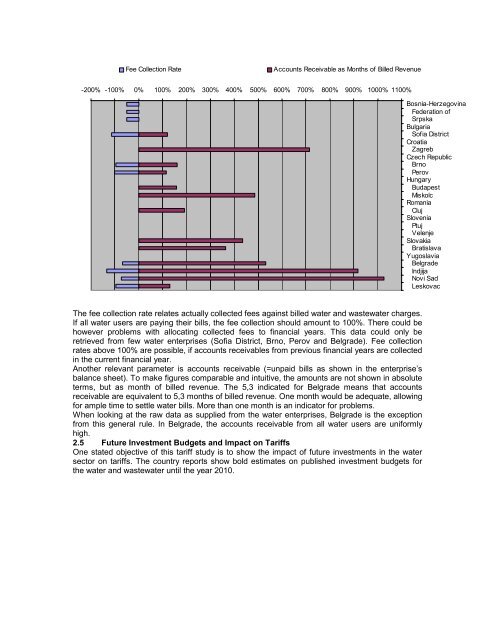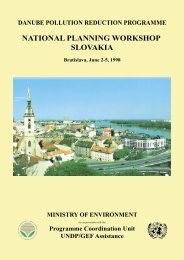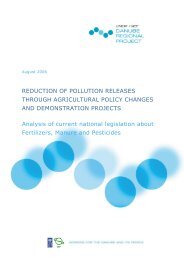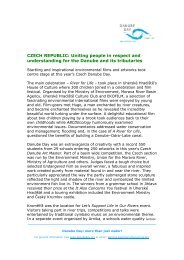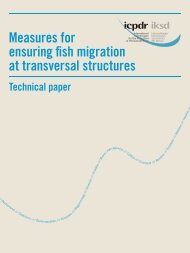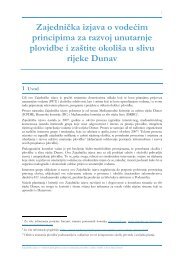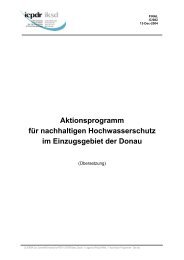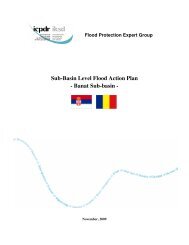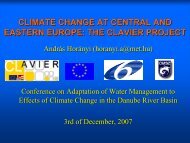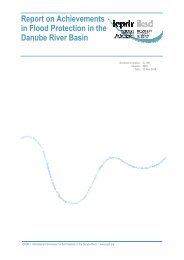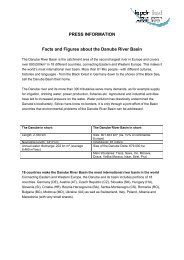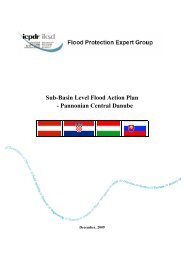Tariff Study Executive Summary - ICPDR
Tariff Study Executive Summary - ICPDR
Tariff Study Executive Summary - ICPDR
Create successful ePaper yourself
Turn your PDF publications into a flip-book with our unique Google optimized e-Paper software.
Fee Collection Rate<br />
Accounts Receivable as Months of Billed Revenue<br />
-200% -100% 0% 100% 200% 300% 400% 500% 600% 700% 800% 900% 1000% 1100%<br />
Bosnia-Herzegovina<br />
Federation of<br />
Srpska<br />
Bulgaria<br />
Sofia District<br />
Croatia<br />
Zagreb<br />
Czech Republic<br />
Brno<br />
Perov<br />
Hungary<br />
Budapest<br />
Miskolc<br />
Romania<br />
Cluj<br />
Slovenia<br />
Ptuj<br />
Velenje<br />
Slovakia<br />
Bratislava<br />
Yugoslavia<br />
Belgrade<br />
Indjija<br />
Novi Sad<br />
Leskovac<br />
The fee collection rate relates actually collected fees against billed water and wastewater charges.<br />
If all water users are paying their bills, the fee collection should amount to 100%. There could be<br />
however problems with allocating collected fees to financial years. This data could only be<br />
retrieved from few water enterprises (Sofia District, Brno, Perov and Belgrade). Fee collection<br />
rates above 100% are possible, if accounts receivables from previous financial years are collected<br />
in the current financial year.<br />
Another relevant parameter is accounts receivable (=unpaid bills as shown in the enterprise’s<br />
balance sheet). To make figures comparable and intuitive, the amounts are not shown in absolute<br />
terms, but as month of billed revenue. The 5,3 indicated for Belgrade means that accounts<br />
receivable are equivalent to 5,3 months of billed revenue. One month would be adequate, allowing<br />
for ample time to settle water bills. More than one month is an indicator for problems.<br />
When looking at the raw data as supplied from the water enterprises, Belgrade is the exception<br />
from this general rule. In Belgrade, the accounts receivable from all water users are uniformly<br />
high.<br />
2.5 Future Investment Budgets and Impact on <strong>Tariff</strong>s<br />
One stated objective of this tariff study is to show the impact of future investments in the water<br />
sector on tariffs. The country reports show bold estimates on published investment budgets for<br />
the water and wastewater until the year 2010.


